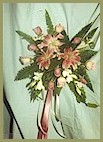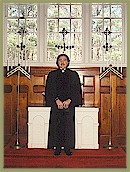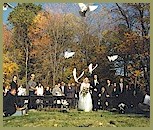| New England's Most
Popular Justice of the Peace/Clergy |
|
|
Selecting
a Wedding Officiant
by Honorable Reverend Dennis James Robinson |
|
|
 |
A
number of families visualize a wedding ceremony taking place in
a church or synagogue, with no exceptions. This is
certainly stereotypic of most marriages many years ago and a
large number of weddings now, but the times are changing and so
are the types of ceremonies couples are choosing. |
|
|
| The
antithesis, or sharp contrast, to the traditional view is
watching a Justice of the Peace, the bride, the groom, and the
entire wedding party jump from an airplane at 4,000 feet, free
fall another 2,000 feet, and then exchange vows before opening
parachutes and floating to the ground as husband and wife.
These are images that most officiants (myself included) are
attempting to alleviate from public perception. |
|
| A Justice
of the Peace, or clergy, can be an important part of a wedding
ceremony if you select the right one for you. Many
individuals may not get married in traditional settings for one
reason or another. A good officiant can make your day very
special because of the flexibility he or she has in arranging
the ceremony. |
 |
|
|
| My
favorite wedding ceremony is probably the Jewish-Christian
ceremony. When articulately prepared, it can encompass
some of the most wonderful traditions of each culture and
religion. The typical ceremony is about one-half hour
long and can incorporate such modalities as an ecumenical
prayer, the exchange of vows, and the drinking of the wine
ceremony with a prayer in Hebrew and in English, the stepping on
the glass, and the lighting of the unity candle (where one
candle represents the individuality of the bride and the other,
the individuality of the groom). The candles also
represent the merging of two into one, but remaining
individual. It is my usual custom to mention that although
you have mutual as well as individual interests, these two outer
candles represent your individuality, but now unite your lives,
your hearts, and your families into one by lighting the center
candle. |
|
 |
Probably
the newest ceremony tradition is the presentation of roses to
the families of the bride and groom. Roses represent the
nurturing from our parents, so the bride and groom use them to
thank their parents for all the love and guidance they have
given them over the years. This delivery can be modified
by adding grandparents for all the love and guidance they have
given them over the years, the person who introduced the couple, or
even all women as they enter the chapel or ceremony site. |
|
|
| Wedding
vows are such an important part of a ceremony, and you should be
offered at least 20 vows from which to choose. Some
priests, ministers and rabbis are extremely traditional,
however, and an uninformed bride and groom may not know that
they can change the vows. For instance, how about "I
take you to be my wife and my best friend," or replacing
"till death do us part" with "Always and
forever." |
|
| Many
traditional officiants and uneducated justices will not attend
rehearsals. This can be the biggest travesty of the
wedding, as it leads to an atmosphere of chaos in the minutes
before the actual wedding. |
|
| The
person who performs the ceremony should run the rehearsal from
start to finish. Having one person leading the rehearsal
can be very helpful in eliminating pre-wedding stress.
This person will be able to tell you how the wedding party
should stand, the pace at which the bridesmaids should enter,
who should hold the bride's flowers during the vows, how the
ushers should unroll the aisle runner, how the bride and her
father should proceed, and what everyone should do with their
hands during the ceremony. By refusing to do a rehearsal,
the officiant either does not care or is not well trained in
running such an event. (Remember, the officiant should be
compensated for his or her attendance or lack of attendance at
the rehearsal.) |
 |
|
|
| Often,
the engaged couple mistakenly thinks everyone performs the same
ceremony during a marriage, and they do not bother to compare
the different types of services offered. The couple should
also make sure the officiant is willing to perform the ceremony
in the location they request. |
|
| It is
important to find out what the officiant will be wearing for the
occasion. If you are planning a formal wedding and all are
in tuxedos, the officiant should be, too. He should also
wear a robe. This adds ambiance and neutrality to the
ceremony. |
|
 |
Finally,
your wedding day is the most important day of your life. Talk to
different officiants before you select one. Ask if you can
observe a ceremony they are performing in a public place.
If they will not let you watch, chances are they have something
to hide. Remember, price can vary from justice to clergy,
depending on prenuptial conferences, rehearsal, and so on.
Try to find someone who will get involved in your plans.
These individuals are usually the people who will care the most
about your special day. Ceremonies are not very long, but
fond memories last forever. |
|
|
|
Other Articles: |
Memorable
Weddings, Blunders, Bloopers & Mishaps
The
Family Medallion - Everybody Got Married
Interfaith Ceremonies |
|
|

